Borno’s Displaced Remember What Christmas Was Like Before Insurgency
Magdalene Dauda’s husband liked to travel to the city to buy vogue clothes for the children. It was always a matching outfit for him and his wife. Maryamu, on the other hand, made philanthropy her business every festive season. But this is all in the past now and all they have are memories as their children yearn for new clothes.
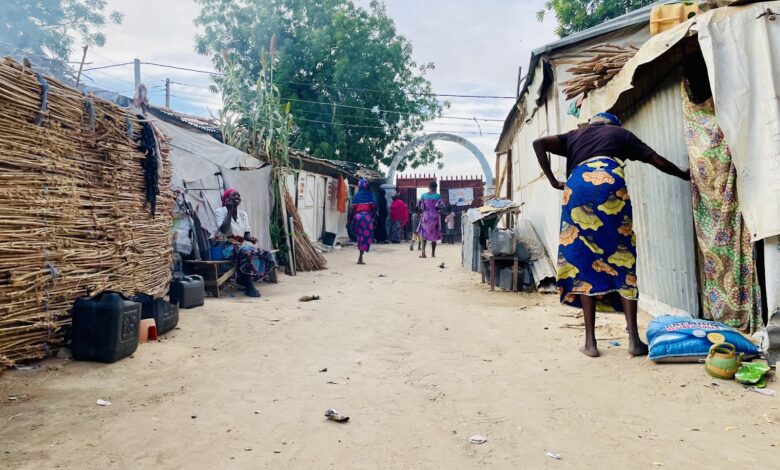
The Christmas preparations for the Daudas usually started in October. Since they had a rather large extended family, this enabled Magdalene and John Dauda to put things in place early.
And there was a lot to do.
The ritual meant scouting for new clothes for their eight children, including some relatives. Then, of course, getting the meat and foodstuff sorted. They ensured they also saved enough money for gifts and welfare. The last bit was putting up decorations and keeping the guest room clean and ready for those coming from the city to Monguno town located in a local government area of the same name in northeastern Nigeria.
Magdalene was a trader who sold foodstuff wholesale. Her husband John, on the other hand, was a successful farmer who farmed even during the dry season. They always celebrated Christmas in a big way.
“All our children got anything they wanted. In the month of October, my husband travels to the city to buy vogue Christmas clothes for our children, and he buys the same colour of material for me and him to sew for church service on Christmas day,” Magdalene told HumAngle.
“When my husband returns from the market, he would give me money to buy meat and foodstuff like oil, flour, rice, vegetables and ingredients for me to make rich rice and stew for our Christmas feast.”
To support her husband, Magdalene, in turn, used her money to buy gifts. She also ensured she had cash for visitors on D-day. She was particular about giving return transport fare and some extra change to those who came from the city.
Their budget
The Daudas always made a handsome budget for the festive season, Magdalene revealed. They spent not less than ₦70,ooo (about $88) on new clothes alone. “At least for foodstuff and other miscellaneous things, we spent not less than ₦150,000,” she said.
The economic situation was much better at the time, she recalled, unlike today, when the cost of goods and services has skyrocketed.
By 2010, the exchange rate of the Nigerian naira was about ₦150 to a dollar. In 2015, when Goodluck Ebele Jonathan handed over the presidency to Muhammadu Buhari, it fluctuated from ₦183 in January to ₦199 in December. At the time this report was filed, the naira was about ₦800 to a dollar at the official window.
The Daudas spent money the way they did because they had the means back then and could afford what they needed for Christmas. But now life has dealt them a savage blow. The family lost all those privileges when Boko Haram attacked Monguno and displaced everyone about nine years ago.
“My husband is not alive now, and living as an IDP without work has been very difficult for me and my children. We can’t afford anything now, and Christmas is near,” Magdalene said.
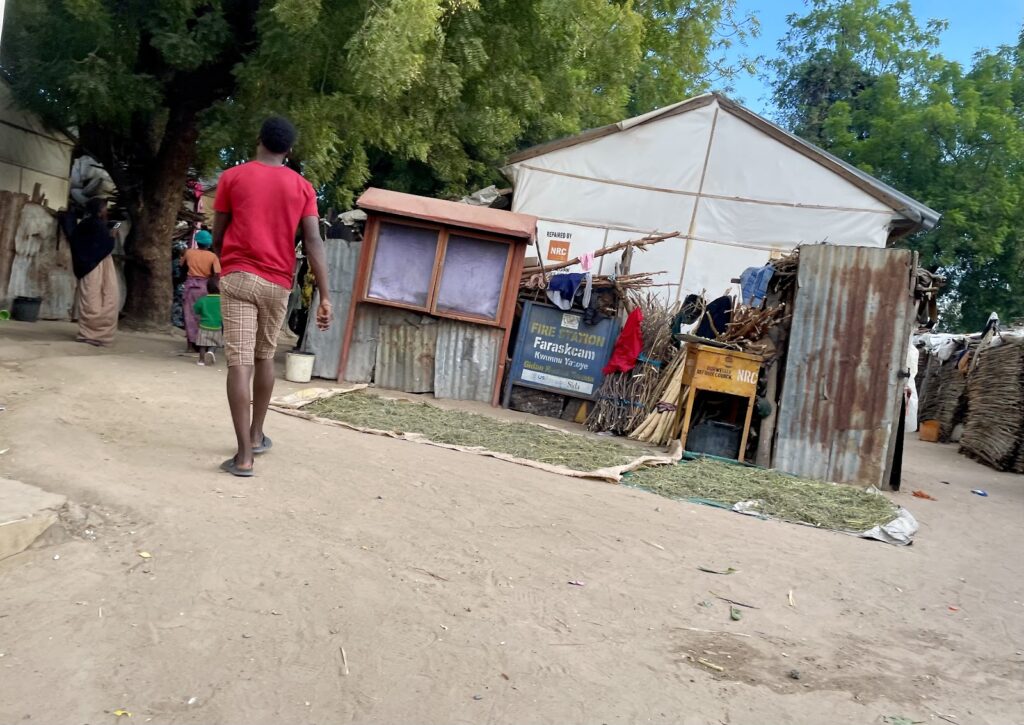
Running
“When Boko Haram came to Monguno, everyone was frightened. We were aware of the killings they carried out. Especially, they kill men and the women they capture, they make them their wives,” Magdalene continued.
That day, nine years ago, John dashed out of their house to escape. Boko Haram members had stormed their neighbour’s house, and the men there were shot dead. Her husband was determined not to be the next victim. Unfortunately, he was sighted and shot. He died right there at the door of his home.
Inside the house, the family had heard John scream and knew before they scrambled out and jumped the fence what that meant – their breadwinner was gone.
Magdalene would not have believed she could play such a significant role in the escape of her eight children. Three weeks before the attack, she had given birth to twins and had suffered some complications. As she ran, she experienced excruciating pain. Worse, she was carrying the twins while she kept the other children close. After they scaled their fence, they made for the bushes. This was when they embarked on the nearly 138 km trek for Maiduguri. And it took them three days.
But before then, they did not flee Monguno alone. They met other families along the way, and Magdalene remembered a pregnant woman in particular. She was already in labour, but there was nothing they could do as they fled for safety.
“It was night, but we were running in the bush until we made sure the distance was much, and we could not hear any sound from Monguno. The pregnant woman was crying and desperately needed to rest, but we kept moving.”
The strangest scene
Magdalene, her children and their companions had been on the run for a while. They decided to rest under a tree where several others lay fast asleep.
When it was dawn, they discovered that those they had met earlier beneath the tree were still sleeping.
“We tapped the people, about seven of them, to wake up and let them join us to keep on moving, but they didn’t move…and when we checked, they were all dead,” Magdalene narrated.
Fear gripped the entire group. It sent a shiver down their bodies to think that they had slept all night beside corpses. This drove them to continue their journey towards Maiduguri.
Later in the day, the pregnant woman could not move and fainted. Magdalene and everyone else were helpless. They were exhausted and could hardly offer any help.
“The woman gave birth to twins. She remained unconscious for a while before we continued moving,” Magdalene said, adding that the woman abandoned the newborns right there. “We left the babies there and kept moving.’’
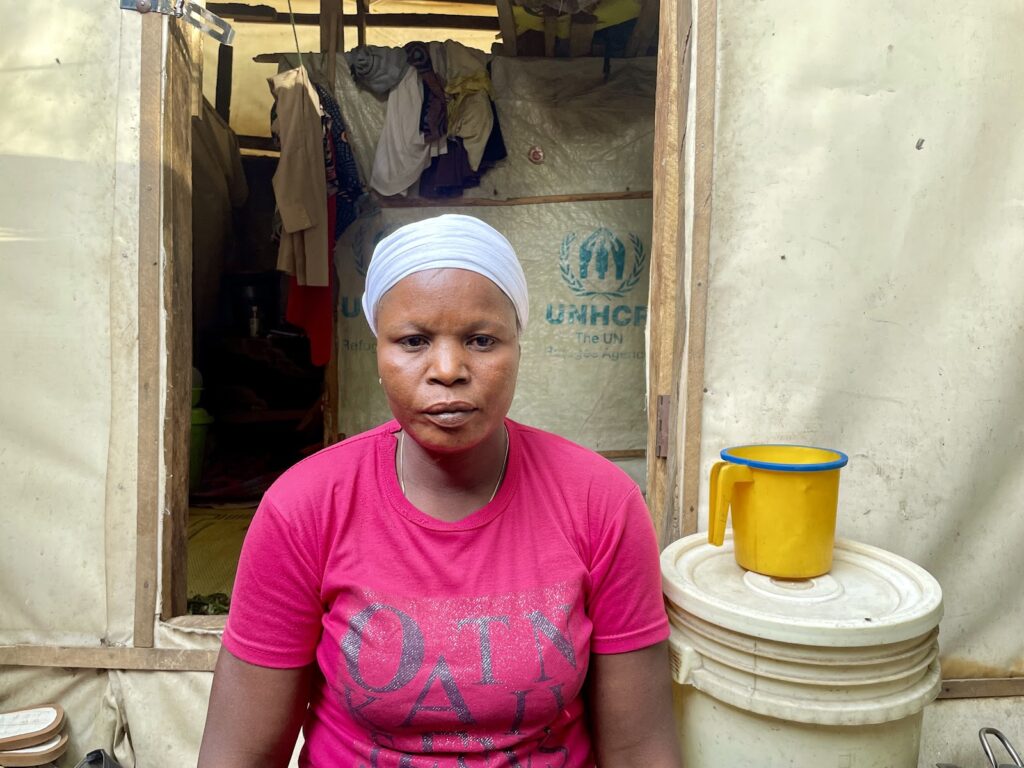
Three days later, they reached Gajiganna, a remote community close to Maiduguri. There, they met vehicles going to Maiduguri. “They charged me and my children nine thousand naira for the short ride to Maiduguri. We knew it was our situation they took advantage of,” Magdalene said.
Difficult living conditions started the very day they reached Maiduguri. There was nowhere to go and no money to buy food. Magdalene had already spent N9,000 out of the N14,000 she carried from home. Months later, the Ekklesiyar Yan’uwa, a Nigeria (EYN) IDP Camp provided by the Christian Association of Nigeria (CAN), was established, and her children started living there.
“Since we came to this camp, we lost everything we used to have. Joy, money, happiness, business, life, protection, independence, and good life has gone.”
It is eight years now since they left their hometown, and each year, the children ask for their Christmas clothes.
Magdalene depends on menial jobs on farms and the support she sometimes gets from relatives. “Even food we don’t have, how can we buy Christmas clothes?” she told her children this year.
The relatives who used to assist with food and money have their problems, too, and the kindness they showed did not last long. They stopped assisting the family over time. It is a year now since the Daudas last received humanitarian assistance. Their lives, she explained, have been full of turbulence in the past year.
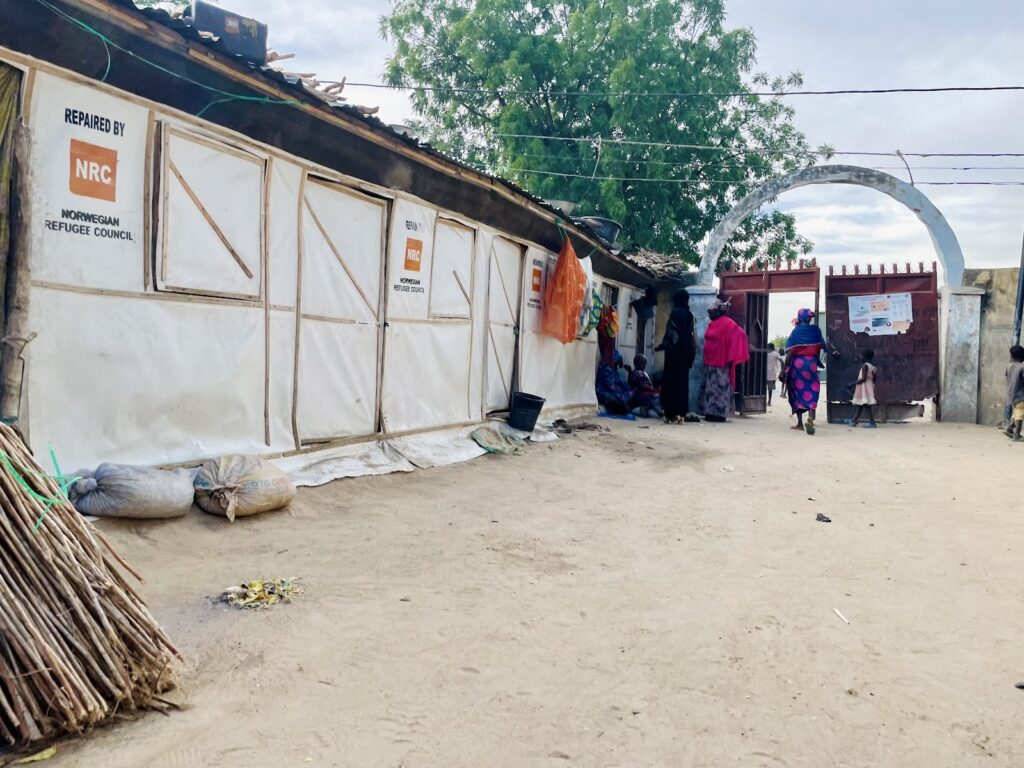
Currently, there are about 450 households in the camp where Magdalene lives. They mostly share similar stories and get to face the same questions from their children – “where are our Christmas clothes?”
In turn, the children continue to get the same response of “no Christmas clothes” from their parents.
Days to Christmas
There are actually bigger concerns weighing on the minds of the adults this December beyond clothes. Many parents living in displacement camps in Maiduguri cannot afford to prepare the annual feast because they lack the resources.
Sixty-year-old Maryamu Kitakwa fled Attagara, a mountainous community in Gwoza LGA, on June 14, 2014, when Boko Haram attacked the village. Since then, she has never gotten the opportunity to enjoy the ritual of buying food and preparing a feast for the Christmas celebration as she used to before displacement.
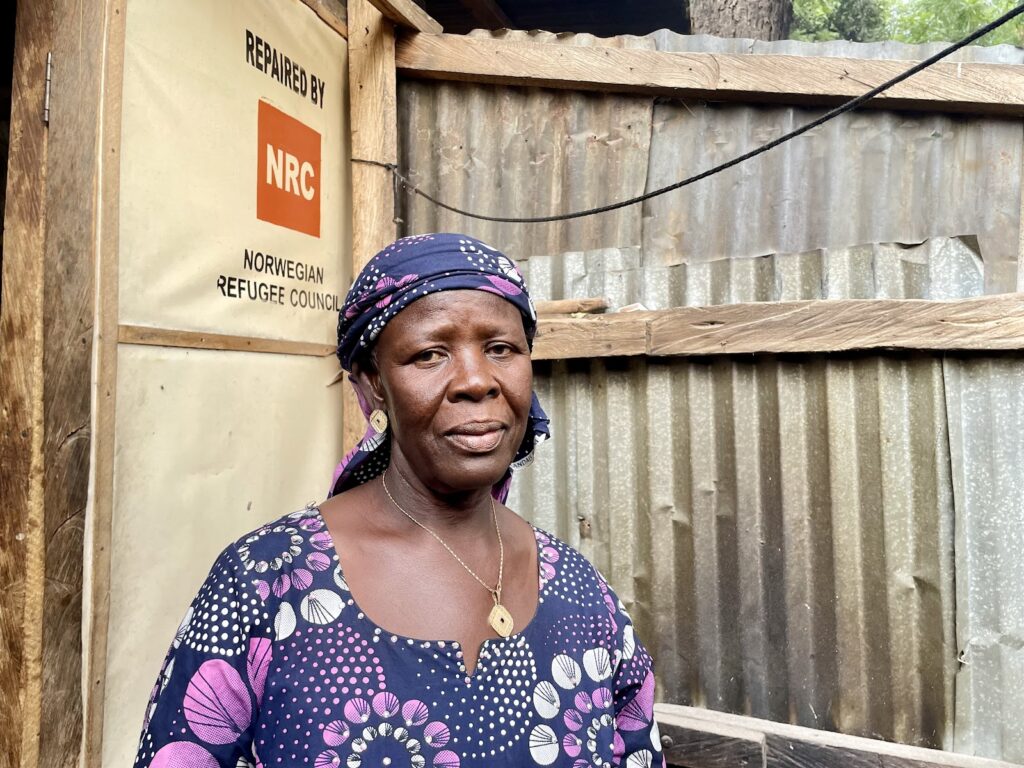
Maryamu is working at getting her youngest, out of seven children, to acquire a university education, and this alone gets her exhausted. He has already missed some sessions because she was unable to raise the fees several times.
“One time, I couldn’t get the money from people to fund his school fees, and he sat at home for one whole session. All his mates have graduated now, and he was left behind because we don’t have the means to pay his school fees,” she explained. “I cannot afford to buy good things like clothes, food and meat to properly celebrate Christmas like we used to in our village just because we have nothing.”
Maryamu’s family still holds on to the dream of one day returning to their hometown. “We cannot do anything, and anyone that we know is tired of us,” she said. And this is where the memories started flooding in.
Once, before they were displaced, she used to be a generous woman who supported anyone preparing for Christmas, but she is now on the other side of the fence, she told HumAngle. To make matters worse, she resides in a camp where the good things in life are scarce.
That fateful day on June 14, Maryamu was taking her bath when Boko Haram attacked her community. Everywhere became chaotic in the twinkling of an eye.
“I ran out of the town. I was only wearing a wrapper to cover my body. Boko Haram members didn’t touch me and only directed that I leave the town,” she narrated, adding that her age was the reason they did not harm or abduct her.
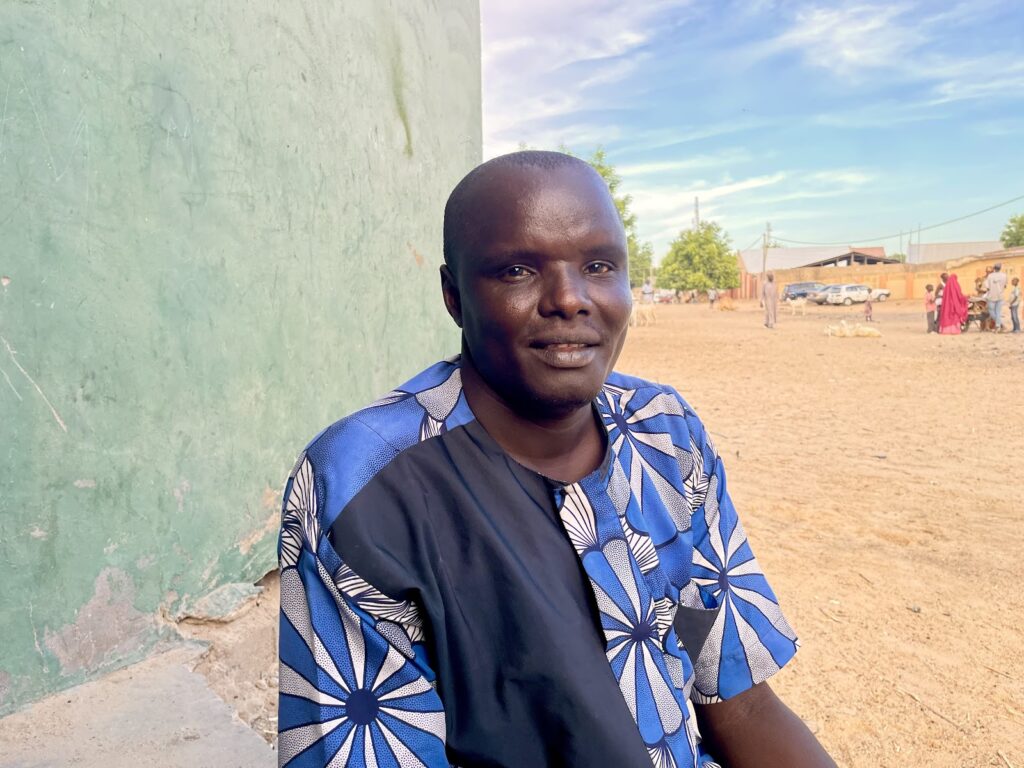
Musa Barka Amuda, the secretary of the camp, lamented about how humanitarian assistance for the camp, both from government and nongovernmental organisations, ceased.
“We are urging the public to come and support us in this camp because everyone is in need of support. We need food, school for our children and economic support that we can use to live happily,” he said.
Amuda added that half of the camp’s population do not have access to assistance and even those who do live in poverty, because the last time they received relief items was a year ago.
Support Our Journalism
There are millions of ordinary people affected by conflict in Africa whose stories are missing in the mainstream media. HumAngle is determined to tell those challenging and under-reported stories, hoping that the people impacted by these conflicts will find the safety and security they deserve.
To ensure that we continue to provide public service coverage, we have a small favour to ask you. We want you to be part of our journalistic endeavour by contributing a token to us.
Your donation will further promote a robust, free, and independent media.
Donate HereStay Closer To The Stories That Matter




